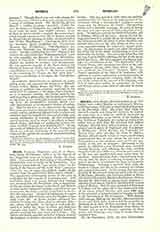

Morell, JULIANA, Dominican nun, b. at Barcelona, Spain, February 16, 1594; d. at the convent of the Dominican nuns at Avignon, France, June 26, 1653. The accounts of the learning of this celebrated Spanish lady seem to border on the miraculous. In a laudatory poem Lope de Vega speaks of her “as the fourth of the Graces and the tenth Muse”, and says “that she was an angel who publicly taught all the sciences from the professorial chairs and in schools”. The apparently extravagant praise of the poet is confirmed; by the reports of contemporaries. Left motherless when very young, Juliana’s first training was received from the Dominican nuns at Barcelona. At the age of four she began Latin, Greek, and Hebrew at home under competent teachers, and, when not yet seven years old, wrote a pretty Latin letter to her father who was away. Accused of taking part in a murder, the father fled to Lyons with his daughter, then eight years old. At Lyons Juliana continued her studies, devoting nine hours daily to rhetoric, dialectics, ethics, and music. At the age of twelve she defended in public her theses in ethics and dialectics “summa cum laude”. She then applied herself to physics, metaphysics, and canon and civil law. Her father, who had meanwhile settled at Avignon, wanted his daughter to obtain a doctorate in the last named faculty. This was gained in 1608, when she publicly maintained her law theses at the papal palace of the vice legate before a distinguished audience, among whom was the Princesse de Conde. Disregarding wealth and a desirable marriage, she entered during the same year the convent of Sainte Praxede at Avignon. In 1609 she received the habit of the order, and on June 20, 1610, took the vows. Just as she had distinguished herself in secular life by her learning, so in the order she excelled all others in piety, humility, and faithful observance of the rules, being on three occasions, notwithstanding her reluctance, named prioress. In this manner the pious nun spent the remainder of her life in the order, well-pleasing to God and beloved by the sisters. For two years before her end she was in great bodily suffering and her death agony lasted five days. She left a number of religious writings: (I) a translation of the “Vita Spiritualis” of St. Vincent Ferrer, with comments and notes to the various chapters (Lyons, 1617; Paris, 1619); (2) “Exercices spirituels sur l’eternite” (Avignon, 1637); (3) French translation of the Rule of St. Augustine, with addition of various explanations and observations for the purpose of instruction (Avignon, 1680); (4) History of the reform of the convent of St. Praxedis, with lives of some pious sisters, in manuscript; (5) Latin and French poems, some printed and some in manuscript.
N. SCHEID

